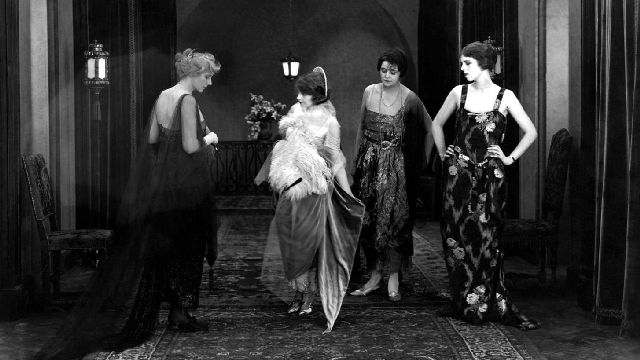Way Down East (1920) 
“A simple story for plain people.”

Director: D W Griffith
Cast: Lillian Gish, Richard Barthelmess, Mrs. David Landau
Synopsis: A naive country girl is tricked into a sham marriage by a wealthy womanizer, then must rebuild her life despite the taint of having borne a child out of wedlock.
Poor Anna Moore (Lillian Gish) has a hard time ahead of her. She and her mother are living in penury, and so Anna volunteers to travel to Boston to visit their wealthy relatives, the Tremonts, in the hope of a hand-out. Like a lamb to the slaughter, she arrives unannounced at her cousin’s house. They look down on her with haughty disdain, and leave her to the immoral attentions of one Lennox Sanderson (Lowell Sherman in top slimy eyebrow-arching form). Lennox is a wealthy womaniser who obsesses on a woman until he has had her, and then once he has, promptly drops her and heads off in pursuit of his next conquest.
Anna is feisty, but she’s also incredibly naive. This is how gullible she is; in order to get her in the sack, Sanderson orchestrates a sham marriage ceremony at his mate’s house, and Anna falls for it without a moment’s doubt or hesitation. Lennox is briefly assailed by an uncustomary pang of conscience, but one glance at Anna’s stockinged legs soon sets him straight again. He swears her to secrecy over their marriage, fearful that his father will cut him out of the family fortune. Not for one second smelling anything like a rat, Anna complies and drifts home to drop heavy hints to her mother about how their money worries will soon be over. When she discovers that she’s pregnant, Anna can’t wait to inform the father, but his reaction isn’t quite as enthusiastic as she had expected. ‘I’ll let you have lots of money,’ he tells her, ‘and you can go away.’ Oh, and by the way, he also tells her, we’re not really married, I just told you that to get you in the sack. What a bounder…
Way Down East is a typically melodramatic D W Griffith film, with its overbearing morality firmly entrenched in Victorian values that were already starting to look a little outdated at the dawn of the Roaring Twenties. The film is littered with inter-titles written in a horribly florid style, and makes a bad mistake in trying to combine its heavy strand of melodrama with a humorous vein that simply doesn’t work. The humour is broad and unfunny, and pads out the running time to a mind-numbing two hours and twenty-five minutes. I mean, does it really have to take that long to tell such a simple tale? Would any other director have gotten away with it? Of course they wouldn’t. But this was Griffith, the visionary and artist, who obviously still had enough of a reputation in Hollywood to get away with such excess.
The film’s climax is justly famous, and shows how skilled Griffith was at creating scenes of incredible excitement and tension. He was aided immeasurably by the commitment of his cast. Both Gish and her leading man, the handsome, chisel-jawed Richard Barthelmess, ventured out into a real snow storm to film the climactic scenes. It was Gish, and not a double, who lay on the ice floes with her hair and one hand in the icy waters. She later revealed that she never fully recovered the feeling in her hand after filming that sequence. That sequence alone justified her sacrifice — the rest of the movie is a bloated, indulgent chore to sit through.
(Reviewed 28th June 2012)
httpv://www.youtube.com/watch?v=QaUQORQoFhA
